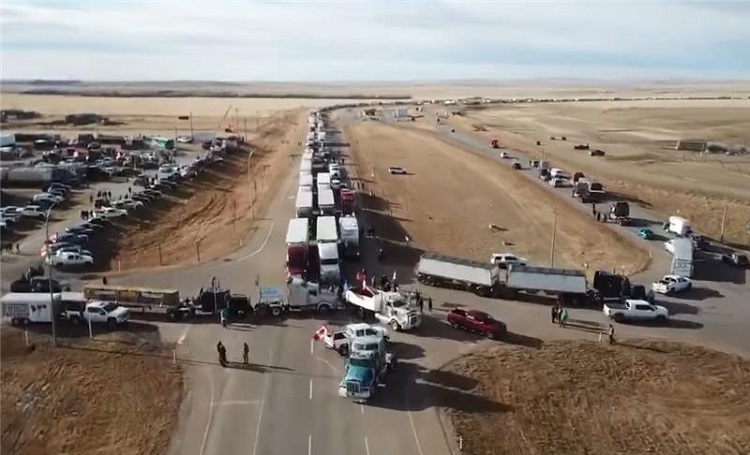Alberta
Premier Danielle Smith says federal EV mandate doesn’t work for Albertans

Federal electric vehicle mandate: Premier SmithPremier Danielle Smith issued this response to the federal zero-emission vehicle mandate: “Alberta’s government supports reducing emissions from the transportation sector and supporting Albertans who wish to drive lower-emissions vehicles. However, these efforts must be led by and support consumers and businesses, and the federal government has no legal or moral authority to tell Albertans what vehicles they can and cannot buy. “Alberta has already purchased and is working with municipalities and industry to explore the use of hydrogen-powered vehicles in our provincial transportation fleet and evaluating options to increase hydrogen fuelling stations across Alberta. We’re funding pilots that are testing long-range hydrogen trucks for industry and buses in major cities. We’re working with the same partners to improve access to EV charging stations. The federal government should rein back its failed command economy tactics and work with us on a consumer-based market approach that is achievable and doesn’t hurt people. “And yet, in another show of total disregard for the well-being of Canadians, the federal government has unilaterally imposed an unconstitutional edict with a bizarrely impossible timeline that will result in massive increases in the cost of vehicles and utility bills, vehicle rationing and wait lists, increased costs to businesses and elevated difficulty and safety risk for hundreds of thousands of Albertans and Canadians just trying to get to work and family activities in our unpredictable, and often cold, climate. “The sheer hypocrisy of this announcement is astounding. To date, the federal government’s EV approach has been a disaster. The independent federal commissioner of the environment and sustainable development found Ottawa is failing to meet its current target of making 80 per cent of the federal government’s fleet vehicles net zero by 2030. The federal commissioner found that if progress continues at the current rate, the federal government will reach only one per cent of its target by 2030. Not only are there not enough electric vehicle chargers, Ottawa doesn’t even know where EV chargers are needed. The federal government will fail to hit its target even where it has complete discretion, and yet it plans to mandate similar targets on consumers throughout all of Canada. “Although it seems rather obvious to say, emissions targets and regulations must be realistic, achievable, and cannot result in multiple severe harms to millions of Canadians. A federal government that can’t transition its own fleet to EVs should not be telling Albertans and Canadians to do what even it is unable to do. “It’s also deeply concerning that Ottawa is trying to force increased demands on the electricity grid while simultaneously weakening Alberta’s and other provinces’ grids through their federal electricity regulations. Our electric grids are not equipped to handle the massive demand surge that a forced full-scale transition to EVs would need to accommodate the delusional timelines in Ottawa’s regulations, and the federal government has not provided remotely enough financial assistance to assist provincial grids to meet this mandated electricity demand. “Further, these new regulations will result in a shortage and rationing of traditional vehicles starting in 2026 and even earlier, as millions of consumers in need of combustion engine vehicles, especially those living in smaller municipalities that commute long distances, will be unable to power or afford an EV but also won’t be able to find an appropriate vehicle to drive in their circumstances. Apparently, the federal government doesn’t understand that freezing with their families in -30 C on the side of a rural road is not an option for Albertans. “There is a way to encourage Canadians to drive more EVs, hydrogen-powered cars and other low-emission vehicles. Instead of telling Canadians how to spend their money and lining up for the right to purchase what they need, the federal government should focus on helping provinces develop infrastructure and advance technologies that are more suitable to Canada’s long distances and cold weather. “Canadians deserve more than destructive virtue-signalling regulations and unachievable targets. Unfortunately, this federal government continues to show that it is all rhetoric and no substance. This approach does not serve Canadians and it won’t protect the environment. “The Government of Alberta will do everything within its legal jurisdiction to thwart implementation of these unconstitutional regulations in our province.” |
Alberta
Former senior financial advisor charged with embezzling millions from Red Deer area residents

News release from Alberta RCMP
Former senior financial advisor charged for misappropriating nearly $5 million from clients
On April 4, 2024, the RCMP’s Provincial Financial Crime Team charged a Calgary resident for fraud-related offences after embezzling millions of dollars from his clients while serving as a senior financial advisor.
Following a thorough investigation, the accused is alleged to have fraudulently withdrawn funds from client accounts and deposited them into bank accounts he personally controlled. A total of sixteen victims were identified in the Red Deer area and suffered a combined loss of nearly $5 million.
Marc St. Pierre, 52, a resident of Calgary, was arrested and charged with:
- Fraud over $5,000 contrary to section 380(1)(a) of the Criminal Code; and,
- Theft over $5,000 contrary to section 344(a) of the Criminal Code.
St. Pierre is scheduled to appear in Red Deer Provincial Court on May 14, 2024.
“The ability for financial advisors to leverage their position to conduct frauds and investment scams represents a significant risk to the integrity of Alberta’s financial institutions. The investigation serves as an important reminder for all banking clients to regularly check their accounts for any suspicious activity and to report it to their bank’s fraud prevention team.”
- Sgt. John Lamming, Provincial Financial Crime Team
The Provincial Financial Crime Team is a specialized unit that conducts investigations relating to multi-jurisdictional serious fraud, investments scams and corruption.
Alberta
Political parties will be part of municipal elections in Edmonton and Calgary pilot projects

Strengthening Alberta’s local elections
Alberta’s government is introducing legislation to ensure Albertans can rely on transparent, free and fair elections, and municipally-elected officials have clearer accountability measures.
In a democratic society, Albertans expect their local elections to be free and fair, and their elected officials to be held to account by clear rules that govern their local councils. The Municipal Affairs Statutes Amendment Act proposes amendments to the Local Authorities Election Act (LAEA) and the Municipal Government Act (MGA) to add greater transparency to local election processes and ensure local councils and elected officials continue to remain accountable to the citizens who elected them.
“Our government is committed to strengthening Albertans’ trust in their local governments and the democratic process that elects local leaders. The changes we are making increase transparency for Alberta voters and provide surety their votes will be counted accurately. We know how important local democracy is to Albertans, and we will work with local authorities to protect and enhance the integrity of local elections.”
Local Authorities Election Act
Albertans expect free and fair elections and that’s why it’s important we strengthen the rules that govern local elections. To strengthen public trust in local elections, Alberta’s government will eliminate the use of electronic tabulators and other automated voting machines. All Albertans should be able to trust the methods and results of local elections; requiring all ballots to be counted by hand, clarifying rules and streamlining processes for scrutineers will provide voters greater assurance in the integrity of the results.
All eligible Albertans should be able to vote in local elections without impediment. Alberta’s government will limit the barriers for eligible voters to cast a ballot by expanding the use of special ballots. Currently, special ballots can only be requested for very specific reasons, including physical disability, absence from the municipality, or for municipal election workers. By expanding the use of special ballots, the government is encouraging more voter participation.
Amendments in the Municipal Affairs Statutes Amendment Act would increase transparency in local elections by enabling political parties at the local level. Political parties would be enabled in a pilot project for Edmonton and Calgary. The act will not require candidates to join a political party in order to run for a local or municipal office, but will create the opportunity to do so.
In addition, proposed changes to the Local Authorities Election Act would allow municipalities the option to require criminal record checks for local candidates, thus increasing transparency and trust in candidates who may go on to become elected officials.
Municipal Government Act
The role of an elected official is one with tremendous responsibility and expectations. Changes proposed to the Municipal Government Act (MGA) will strengthen the accountability of locally elected officials and councils. These include requiring mandatory orientation training for councillors, allowing elected officials to recuse themselves for real or perceived conflicts of interest without third-party review and requiring a councillor’s seat to become vacant upon disqualification.
If passed, the Municipal Affairs Statutes Amendment Act will also unlock new tools to build affordable and attainable housing across Alberta. Proposed amendments under the MGA would also create more options for municipalities to accelerate housing developments in their communities. Options include:
- Exempting non-profit, subsidized affordable housing from both municipal and education property taxes;
- Requiring municipalities to offer digital participation for public hearings about planning and development, and restricting municipalities from holding extra public hearings that are not already required by legislation; and
- Enabling municipalities to offer multi-year residential property tax exemptions.
Municipal Affairs will engage municipalities and other partners over the coming months to hear perspectives and gather feedback to help develop regulations.
Quick facts
- The LAEA establishes the framework for the conduct of elections in Alberta municipalities, school divisions, irrigation districts and Metis Settlements.
- The MGA establishes the rules governing the conduct of local elected officials once on council, as well as the overall administration and operation of municipal authorities in Alberta, including any policy those authorities may wish to implement.
Related information
-

 Business2 days ago
Business2 days agoDon’t be fooled by high-speed rail
-

 Alberta2 days ago
Alberta2 days agoAlberta rejects unconstitutional cap on plastic production
-

 Addictions2 days ago
Addictions2 days agoBritish Columbia should allow addicts to possess even more drugs, federal report suggests
-

 Also Interesting2 days ago
Also Interesting2 days agoIs the Anger Toward Fiat Currency Justified?
-

 Alberta2 days ago
Alberta2 days agoActivity-Based Hospital Funding in Alberta: Insights from Quebec and Australia
-

 Business2 days ago
Business2 days agoUN plastics plans are unscientific and unrealistic
-

 Censorship Industrial Complex2 days ago
Censorship Industrial Complex2 days agoAustralian politicians attack Elon Musk for refusing to remove video of Orthodox bishop’s stabbing
-

 Business2 days ago
Business2 days agoTaxpayers criticize Trudeau and Ford for Honda deal







